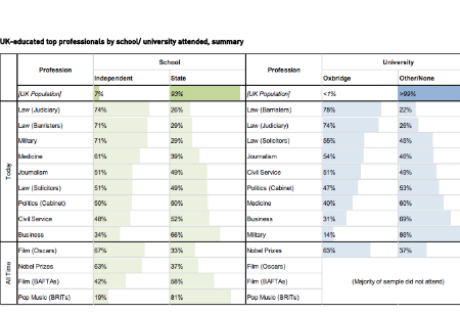
We thought you might be interested in this Academy tool...
-

Commercial Awareness Toolkit
We take you step-by-step through the thinking process to unlock and demonstrate your commercial awareness.


Written By Jack J Collins, Editor, AllAboutLaw.co.uk
Written By Jack J Collins, Editor, AllAboutLaw.co.uk

Latest data from the Sutton Trust has showed that the privately-educated-Oxbridge stereotype that pervades the justice system and the Bar, is still a correct one.
The statistics show that whilst only 7% of the UK population were educated privately, a huge 74% of the 147 judges in the country were, and this was backed up by 71% of Barristers, who were also educated at Independent schools.
Things looked a little bit more on an even keel for solicitors, but still less than half of all solicitors surveyed (49%) had gone to a state run school.
There was a similar trend in the University sphere. Whilst less than 1% of the UK population had attended Oxbridge, 78% of barristers surveyed had done, whilst 74% of the judiciary followed suit. 55% of solicitors had also attended one of the two Universities.
The report does nothing to suggest that elitism in the profession has been eradicated over the past quarter of a century, stating that “the judiciary has long been recognised as one of the most elitist professional careers.”
When you consider that in 1989, 76% of judges attended private schools, and this figure remained at 75% in 2004 and 74% in 2015, this seems like a remarkably stable trend and not one that highlights any social mobility within the profession.
The percentage of Oxbridge graduates has declined slowly suggesting that the traditional dominance is slowly abating, from 88% in 1989 to 74% in 2015, but three quarters is still an extremely dominant figure.
The report has stated that the Judicial Appointments Commission, founded in 2006, will help to speed up progress. This commission was set up the commission has the statutory responsibility “to select candidates solely on merit; to select only people of good character; and to have regard to the need to encourage diversity in the range of persons available for judicial selection.”
A similar panel has been set up at the Bar, taking away the power of the Lord Chancellor to appoint QCs, and placing it in the hands of an accountable body. The Queen’s Counsel Selection Panel does in fact highlight diversity as a key criterion, but the figures suggest that far more needs to be done in order to achieve this.
Whilst improvement has been seen across the board, it’s small improvements that are not representative of the UK as a whole. In 25 years there has been far too slow progress, according to the Trust, and their initiatives to diversify the profession are going to need to expand and gain traction if they are to make a real difference to what can be viewed as still an elitist profession.
Advertisement
Advertisement
Blog


We take you step-by-step through the thinking process to unlock and demonstrate your commercial awareness.
